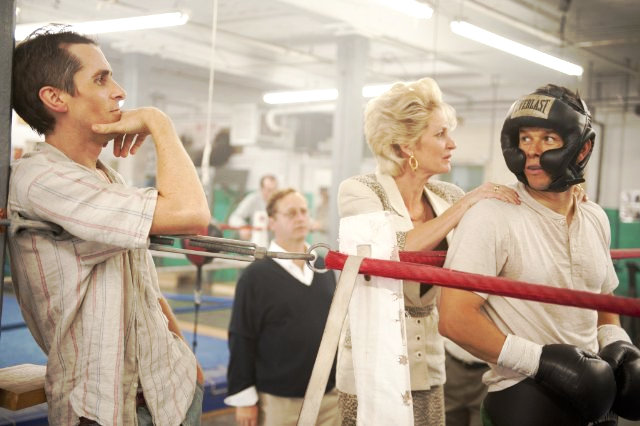BLUE VALENTINE (2010)
directed by Derek Cianfrance
[filmography: directorial debut of a feature film, though has directed many documentaries]
written by Derek Cianfrance, Cami Delavigne, and Joey Curtis
[all pretty much newbies, or at least unknown to me]
starring Ryan Gosling, Michelle Williams, and Faith Wladyka [as Frankie]
ENJOYMENT: ***** (out of 5)
"Loved it"
I thought this film would be a shoe-in for Ryan Gosling at the Academy Awards, and I thought it would get a Best Picture nomination as well. Michelle Williams got nominated for Best Actress in a Leading Role, but this hardly seems justice enough for this film. In fact, it wasn't really until I had this reaction to Blue Valentine's absence in those two categories that I realized how special the film truly is. Blue Valentine is my favorite kind of movie, telling the story of real, raw feelings as relevant as aging love. What happens to two teenagers who have a great couple first dates, become extremely infatuated with one another, and end up getting married? This scenario must describe many marriages, and has for decades, but, in Blue Valentine, director Derek Cianfrance confronts this issue in a contemporary fashion with an extremely original way of telling it. Also, to sweeten the pot, Michelle Williams' character gets pregnant within the first two or three dates, so marriage seems like the most reasonable thing to do. However, later, after shoving divorce way off the table, the two start to realize they really don't get along and splitting up slowly becomes an option.
Both actors exceed even their great reputations, creating a relationship and a dichotomous world between loving and loathing each other that makes for an interesting, real-life case study. The movie takes place between these two worlds, where the main characters, played by Ryan Gosling and Michelle Williams, are young and in love, and 8-to-10 years later when the love runs dry. Anyone who has been in a relationship that started hot and heavy at the beginning, then not too long after began to fizzle, can imagine what it would be like for these characters. What two people can sacrifice for each other in the way of personal goals and dreams can end up compromising one or both involved, and that bitterness can start to shine through after a while. This film explores this in a way similar to what Revolutionary Road or Eyes Wide Shut did, depicting love and marriage in a counter-culture sort of way. Not all of Blue Valentine's moments are so beautiful--in fact, most are not--but the film has a beautiful kind of story to tell: that love must be in a marriage for the long-run, for the sake of everyone involved. In a most clever way, Blue Valentine exposes this couple's relationship to see what it truly is, getting deeper and deeper into the meat of it. Its morals and theme are somewhat under-discussed in film, and it is assuring that this may become a popular discussion. No love is a Jennifer-Aniston- or Hugh-Grant-movie sort of love, and I'm willing to bet most people in relationships have felt more similar to the two characters in this film than most other romance or love stories. Blue Valentine is one of my favorite films of the year, and is full of heart and heart-wrenching moments that will be some of the most memorable in film in 2010.
Both actors exceed even their great reputations, creating a relationship and a dichotomous world between loving and loathing each other that makes for an interesting, real-life case study. The movie takes place between these two worlds, where the main characters, played by Ryan Gosling and Michelle Williams, are young and in love, and 8-to-10 years later when the love runs dry. Anyone who has been in a relationship that started hot and heavy at the beginning, then not too long after began to fizzle, can imagine what it would be like for these characters. What two people can sacrifice for each other in the way of personal goals and dreams can end up compromising one or both involved, and that bitterness can start to shine through after a while. This film explores this in a way similar to what Revolutionary Road or Eyes Wide Shut did, depicting love and marriage in a counter-culture sort of way. Not all of Blue Valentine's moments are so beautiful--in fact, most are not--but the film has a beautiful kind of story to tell: that love must be in a marriage for the long-run, for the sake of everyone involved. In a most clever way, Blue Valentine exposes this couple's relationship to see what it truly is, getting deeper and deeper into the meat of it. Its morals and theme are somewhat under-discussed in film, and it is assuring that this may become a popular discussion. No love is a Jennifer-Aniston- or Hugh-Grant-movie sort of love, and I'm willing to bet most people in relationships have felt more similar to the two characters in this film than most other romance or love stories. Blue Valentine is one of my favorite films of the year, and is full of heart and heart-wrenching moments that will be some of the most memorable in film in 2010.










